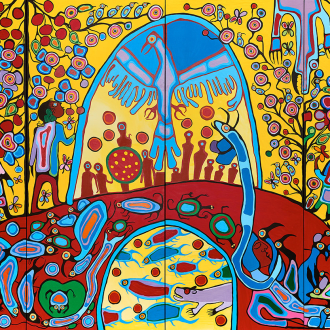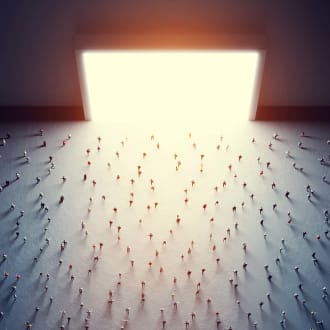The Best of The Walrus
10+ most popular The Walrus articles, as voted by our community.
Trending
These are currently making the rounds on Refind.
Me, My Selfies, and I
Those of us on the line between Gen X and millennial are watching our identities shift and age in a way no previous generation has
The Walrus on Culture
The “Multi-Multi-Multi-Million-Dollar” Art Fraud That Shook the World
Norval Morrisseau was one of the most famous Indigenous artists anywhere. Then the fakes of his works surfaced—and kept coming
The Walrus on Deepfakes
Deepfakes Will Break Democracy
The fragmenting of shared reality is fuelling political extremism and dysfunction
The Walrus on Food
Much Ado about Hummus: The Fight for Bragging Rights over a Middle Eastern Dip
From beet to butterscotch, how far can hummus travel from its origins and still be hummus?
In Defence of Garlic in a Jar: How Food Snobs Almost Ruined My Love of Cooking
Celebrity chefs, food writers, and home cooks have sneered at pre-cut produce. They’re dismissing those of us with disabilities
The Walrus on Housing
Why the Opioid Crisis Is Rooted in the Housing Crisis
A prevalent narrative asserts that the tents, the despair, the not waking up are about mental illness and addiction. That narrative crumbles after the first questions
The Walrus on Relationships
Losing My Faith and Finding Other Ways to Pray
Faith was something I shared with my mother. When she died, I didn’t know what to believe in
As a Therapist, I Know What’s Breaking Couples Up
How relationships come to an end and the scourge of the smartphone
The Walrus on Running
The World’s Oldest Ultramarathon Runner Is Racing against Death
Dag Aabye is eighty-one, lives in an old school bus on a mountain, and is pushing his body to its absolute limits
The Walrus on Society
Why Don’t Millennials Have Hobbies?
I sought the help of an algorithm to figure out how to spend my free time. It made me question my generation’s relationship with leisure
Who Gets to Be Mentally Ill?
Today, people talk about seeing a therapist like they’re going to the dentist. But our compassion around mental health still excludes the people who need it most
«In mental health discourse, there is a strong underlying message that mental health is one’s own responsibility (self-care, expensive therapy, psychiatric intervention, and so on) and that mental unwellness—including mental illness—is something to be overcome, followed by a return to productivity within a capitalist world.»
Popular
These are some all-time favorites with Refind users.
How Do You Make the Perfect Toy?
Fads come and go, but how to create a toy that stands the test of time is the billion-dollar question
Twilight of the Libraries: What Gets Lost When Books Go Off-Site and Online
Libraries can't escape the push for digitization, but we still need actual books on shelves
Robots Are Writing Poetry, and Many People Can’t Tell the Difference
Machines are putting out astonishingly human-like writing. What does that mean for the future of art?
When Big Tobacco Was Forced to Pay
The cigarette industry had its Erin Brockovich moment in the nineties. How has it managed to survive?
Confessions of a Bitcoin Widow: How a Dream Life Turned into a Nightmare
My husband started a cryptocurrency empire that made us rich. When he died, I learned it was just a facade
What is Refind?
Every day Refind picks the most relevant links from around the web for you. is one of more than 10k sources we monitor.
How does Refind curate?
It’s a mix of human and algorithmic curation, following a number of steps:
- We monitor 10k+ sources and 1k+ thought leaders on hundreds of topics—publications, blogs, news sites, newsletters, Substack, Medium, Twitter, etc.
- In addition, our users save links from around the web using our Save buttons and our extensions.
- Our algorithm processes 100k+ new links every day and uses external signals to find the most relevant ones, focusing on timeless pieces.
- Our community of active users gets the most relevant links every day, tailored to their interests. They provide feedback via implicit and explicit signals: open, read, listen, share, mark as read, read later, «More/less like this», etc.
- Our algorithm uses these internal signals to refine the selection.
- In addition, we have expert curators who manually curate niche topics.
The result: lists of the best and most useful articles on hundreds of topics.
How does Refind detect «timeless» pieces?
We focus on pieces with long shelf-lives—not news. We determine «timelessness» via a number of metrics, for example, the consumption pattern of links over time.
How many sources does Refind monitor?
We monitor 10k+ content sources on hundreds of topics—publications, blogs, news sites, newsletters, Substack, Medium, Twitter, etc.
Can I submit a link?
Indirectly, by using Refind and saving links from outside (e.g., via our extensions).
How can I report a problem?
When you’re logged-in, you can flag any link via the «More» (...) menu. You can also report problems via email to hello@refind.com
Who uses Refind?
450k+ smart people start their day with Refind. To learn something new. To get inspired. To move forward. Our apps have a 4.9/5 rating.
Is Refind free?
Yes, it’s free!
How can I sign up?
Head over to our homepage and sign up by email or with your Twitter or Google account.















